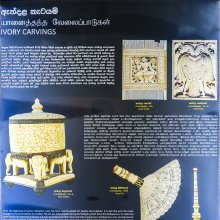Agamika, Āgāmika: 8 definitions
Introduction:
Agamika means something in Hinduism, Sanskrit. If you want to know the exact meaning, history, etymology or English translation of this term then check out the descriptions on this page. Add your comment or reference to a book if you want to contribute to this summary article.
Images (photo gallery)
In Hinduism
Shaivism (Shaiva philosophy)
Source: Brill: Śaivism and the Tantric TraditionsĀgamika (आगमिक) refers to the “future”, according to the Svacchandatantra verse 4.141-145.—Accordingly, “[...] The other form [of bubhukṣu initiation] is the lokadharmiṇī, which destroys both past and future (āgamika) demerit. That lokadharmiṇī-dīkṣā is known to exclude the obligation to propitiate mantras [by means of purvasevā etc.]. However, when the current body breaks, [the candidate] experiences [the series of eight supernatural natural powers] starting with becoming very small. Having experienced [these] enjoyments he moves upwards to whichever [cosmic level] the Guru has joined him [by yojanikā]. Whether this is at the sakala or niṣkala level [of Śiva] depends on [the preference of] the candidate and Guru”.

Shaiva (शैव, śaiva) or Shaivism (śaivism) represents a tradition of Hinduism worshiping Shiva as the supreme being. Closely related to Shaktism, Shaiva literature includes a range of scriptures, including Tantras, while the root of this tradition may be traced back to the ancient Vedas.
Languages of India and abroad
Sanskrit dictionary
Source: DDSA: The practical Sanskrit-English dictionaryĀgāmika (आगामिक).—a. (-kī f.)
1) Relating to the future time; मतिरागामिका ज्ञेया बुद्धिरतत्कालदर्शिनी (matirāgāmikā jñeyā buddhiratatkāladarśinī) Haima.
2) Impending, arriving.
Source: Cologne Digital Sanskrit Dictionaries: Edgerton Buddhist Hybrid Sanskrit DictionaryĀgamika (आगमिक).—m., (a monk) that arrives at (or, returns to) a monastery; visitor, guest, arrival. Not in Pali, which uses āgantuka (= Sanskrit) instead as pendant to gamika (q.v.): Mahāvyutpatti 8748, Tibetan ḥoṅs pa, arrival. Note that 8746 also has āgantuka, defined Tibetan blo bur du ḥoṅs pa, sudden arrival.
--- OR ---
Āgāmika (आगामिक).—adj. (Sanskrit Lex.; no literary occurrence found, tho not marked * in [Boehtlingk]; compare Sanskrit āgāmin, future) of or pertaining to the future (opp. to sāṃdṛṣṭika, q.v.): Mahāvastu ii.405.16 (verse) mā āgāmike vihanyāhi hitvā sāṃdṛṣṭi- kaṃ phalam, do not be subject to disappointment in regard to future (fruit), abandoning visible (actual, of the present life) fruit (reward). Senart's note is wrong.
Source: Cologne Digital Sanskrit Dictionaries: Monier-Williams Sanskrit-English Dictionary1) Āgamika (आगमिक):—[=ā-ga-mika] [from ā-gama > ā-gam] mfn. acquired by tr°adition, [Nyāyasūtra], [Scholiast or Commentator]
2) Āgāmika (आगामिक):—[from ā-gam] a mf(ā)n. relating to the future, [Jaina literature]
3) [from ā-gāntu] b See, [ib.]
Source: DDSA: Paia-sadda-mahannavo; a comprehensive Prakrit Hindi dictionary (S)Agamika (अगमिक) in the Sanskrit language is related to the Prakrit words: Agamiya, Āgamiya.
[Sanskrit to German]
Sanskrit, also spelled संस्कृतम् (saṃskṛtam), is an ancient language of India commonly seen as the grandmother of the Indo-European language family (even English!). Closely allied with Prakrit and Pali, Sanskrit is more exhaustive in both grammar and terms and has the most extensive collection of literature in the world, greatly surpassing its sister-languages Greek and Latin.
Kannada-English dictionary
Source: Alar: Kannada-English corpusĀgamika (ಆಗಮಿಕ):—
1) [noun] a person well learned in scriptures.
2) [noun] a person learned in installation and consecration of idols of deities following traditional rites.
3) [noun] a priest who officiates in a temple.
4) [noun] that which is related to the scriptures.
--- OR ---
Āgamīka (ಆಗಮೀಕ):—[noun] = ಆಗಮಿಕ - [agamika -] 1.
--- OR ---
Āgāmika (ಆಗಾಮಿಕ):—[adjective] of or related to future; coming, (but not yet come).
--- OR ---
Āgāmika (ಆಗಾಮಿಕ):—[noun] expected or probable profit.
Kannada is a Dravidian language (as opposed to the Indo-European language family) mainly spoken in the southwestern region of India.
See also (Relevant definitions)
Starts with: Agamikala, Agamikarma, Agamikarya.
Ends with: Abhyupagamika, Gamagamika, Manavagamika, Naigamagamika, Shathagamika, Vasabhagami, Visalagamika.
Full-text: Agamiya, Samdrishtika, Gamika.
Relevant text
Search found 5 books and stories containing Agamika, Āgāmika, Āgamika, Aga-mika, Āga-mika, Āgamīka; (plurals include: Agamikas, Āgāmikas, Āgamikas, mikas, Āgamīkas). You can also click to the full overview containing English textual excerpts. Below are direct links for the most relevant articles:
Vaisheshika-sutra with Commentary (by Nandalal Sinha)
Sūtra 3.2.18 (Proof of Soul not from Revelation only) < [Chapter 2 - Of the Inference of Soul and Mind]
Sūtra 3.2.8 (Therefore Soul proved by Revelation) < [Chapter 2 - Of the Inference of Soul and Mind]
Sūtra 2.1.17 (The name Air is derived from Scripture) < [Chapter 1 - Of Earth, Waters, Fire, Air, and Ether]
Cidgaganacandrika (study) (by S. Mahalakshmi)
Part 2 - Emergence of Śaiva philosophy < [Philosophy of Kashmir Tantric System]
Puranic encyclopaedia (by Vettam Mani)
Mandukya Upanishad (Gaudapa Karika and Shankara Bhashya) (by Swami Nikhilananda)
Mandukya Karika, verse 2.20-28 < [Chapter II - Vaitathya Prakarana (Illusion)]
Maha Prajnaparamita Sastra (by Gelongma Karma Migme Chödrön)
I. Recollection of the Buddha (4): The five pure aggregates (anāsrava-skandha) < [Part 2 - The Eight Recollections according to the Abhidharma]


